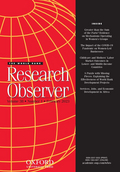Quasi-experimental evidence on carbon pricing
Vrolijk, Kasper / Misato SatoExterne Publikationen (2023)
in: World Bank Research Observer 38 (2), 213–248
DOI: https://doi.org/10.1093/wbro/lkad001
Open access
A growing literature suggests that carbon emissions are most efficiently reduced by carbon pricing. The evidence base on the effectiveness of market-based mechanisms, however, face three key limitations: studies often (a) predict, rather than evaluate effects, (b) show large difference in findings, and (c) cannot always infer causal relations. Quasi-experimental studies can address these challenges by using variation in policies over time, space or entities. This paper systematically reviews this new literature, outlines the benefits and caveats of quasi-experimental methodologies, and verifies the reliability and value of quasi-experimental estimates. The overall evidence base documents a causal effect between carbon pricing and emission reductions, with ambiguous effects on economic outcomes, and there are important gaps and inconsistencies. Our review underscores that estimates should be interpreted with care because of: (i) inappropriate choice of method, (ii) incorrect implementation of empirical analysis (e.g. violate identifying assumptions), and (iii) data limitations. More cross-learning across studies and use of novel empirical strategies is needed to improve the empirical evidence base going forward.


